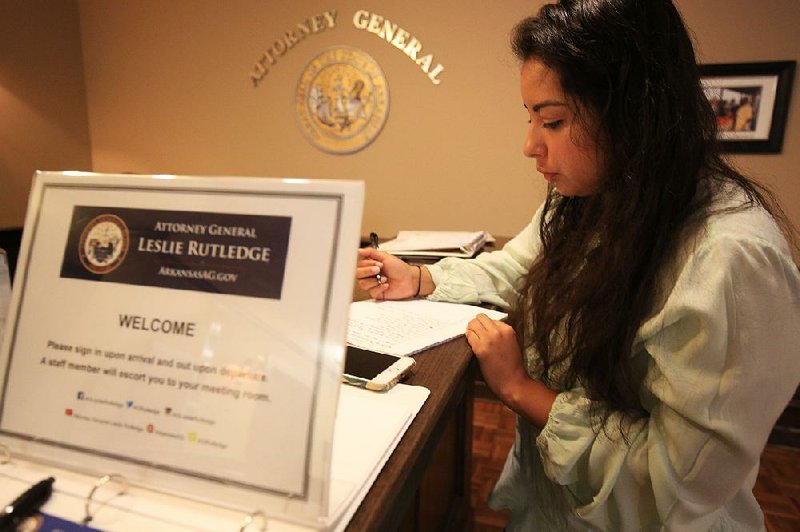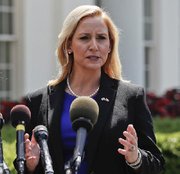Attorney General Leslie Rutledge on Friday stood firm on a pledge to sue President Donald Trump's administration unless the president ends a program protecting people from deportation who illegally arrived in the U.S. as children.
Rutledge, who in June joined leaders in nine other states in a letter imposing a deadline that's next Tuesday for a decision, met with two people benefiting from the program on Friday. But she did not change her mind, her spokesman said on the same day one signatory withdrew his support as the matter drew more national attention.
"The Attorney General still stands by the letter and the September 5 deadline that the coalition gave the administration," Rutledge spokesman Judd Deere said by email.
Trump will make an announcement Tuesday on the Deferred Action for Childhood Arrivals program, a White House spokesman said. More than 5,000 Arkansas residents and nearly 800,000 people nationwide benefit from the status, plus more who are eligible now or will be when they're old enough.
[U.S. immigration: Data visualization of selected immigration statistics, U.S. border map]
In Arkansas, mayors from at least four cities, at least nine state lawmakers and roughly 30 business and civic organization leaders have formally signed on to a letter opposing the program's demise, according to the advocacy group Arkansas United Community Coalition.
The chancellor of the University of Arkansas, Fayetteville, and the bishop of the Catholic Diocese of Little Rock also released statements Friday in support of the program. Hundreds of business leaders across the country have urged Trump to keep the program in place while lawmakers work on a long-term solution.
President Barack Obama's administration established Deferred Action for Childhood Arrivals by executive action in June 2012. The program grants two-year work permits and the deportation break to people without lawful status who came to the U.S. before their 16th birthdays.
Applicants must meet education requirements, pass a criminal background check and have lived continuously in the country since June 2007. Participants, often called "dreamers," are also eligible for driver's licenses.
People who receive the status aren't granted citizenship -- so they can't vote -- or other lawful residency status. Instead, the exemption shields them from immediate removal through prosecutorial discretion. Because they're allowed to legally work, they pay income taxes.
"We love dreamers. We love everybody," Trump said Friday, according to news reports.
During the 2016 campaign, Trump referred to the program as an overreach of executive power that amounted to "amnesty." After his election, he said he would make a decision in February, but the soft deadline came and went without a decision.
The U.S. Department of Homeland Security, in a June announcement of a program offering similar protections to parents of U.S. citizens, said that Deferred Action for Childhood Arrivals would remain in place.
Rutledge, who has called the program "unlawful," then joined attorneys general in eight states and the governor of Idaho in signing the letter, which specifically asked the administration to stop issuing new work permits and renewals through the program.
An estimated 12,000 Arkansas residents are eligible for deferred status, either now or in the future, according to the Migration Policy Institute. More than 5,000 applications have been approved since 2012, according to federal data.
Diana Beltran, now 19, was 6 years old when she came to the United States from Chihuahua, Mexico. Beltran remembers learning to read and write in Spanish while a kindergartner in Mexico but not much else, she said. She and her three siblings have deferred status and jobs.
Beltran lives in Conway and sells insurance for homes and cars. Her deferred status expires in 2019. If the program stands, she can renew it. If not, she'll lose her work permit, driver's license and possibly her insurance license, she said.
"If the program ends, I have to start again from zero," Beltran said, adding that the same would be the case for her siblings. "We would be unemployed and have to find work somewhere else."
Rutledge's chief of staff, Carl Vogelpohl, turned an Arkansas Democrat-Gazette reporter away from Rutledge's meeting Friday with two people who hold deferred status and an advocate. After the meeting, her spokesman, Deere, declined to share what was discussed and forwarded a 2-week-old public statement.
Maria Meneses, a sophomore at Philander Smith College who has deferred status, said the meeting lasted about 15 minutes. Rutledge listened to their stories and wished Meneses well in her goal to become a doctor.
But the attorney general said that "it was her burden to uphold the law no matter what and that's why she decided to be a part of this letter," Meneses said.
Rutledge declined an interview request after the June letter to the Trump administration and has not publicly answered questions about her position.
Last month, Meneses was among a group of people with deferred status and their advocates who met with a Rutledge aide. Meneses tried for weeks to arrange a face-to-face meeting with Rutledge and was prepared to wait in the office lobby all day Friday, she said.
Michel Rangel, deputy director of the immigration advocacy group Arkansas United Community Coalition, also attended the meeting.
"We felt like we did make a strike today in achieving to have a meeting with her," Rangel said. "I think we definitely achieved that, and we were able to put some faces to the issue. She was able to see the emotion in [their] faces."
Tennessee Attorney General Herbert Slatery III, who also signed the June letter, withdrew his support for a lawsuit in a letter to the state's two Republican senators, The Washington Post reported. Slatery's letter referred to "the human element," according to the report.
Bishop Anthony Taylor of the Catholic Diocese of Little Rock, in an open letter shared Friday, asked Gov. Asa Hutchinson to intervene in favor of the program, sometimes referred to as DACA.
"I write to urge you in the strongest terms possible to support this DACA program and to prevent our state from becoming a party to this action," Taylor wrote, adding that a court challenge "unfairly diminishes the dignity of the DACA recipients who have violated no laws. Their dream is to become citizens in the country in which they were raised, in which they were schooled, for which some have served in the military, and in which they call home."
After meeting Rutledge, Rangel and Meneses went to Hutchinson's office to deliver more than a dozen testimonials written by Arkansans who have deferred status. While there, they received an impromptu meeting with the governor, Meneses said.
"He asked about DACA because he wasn't aware," Meneses said. "We also shared stories as well."
Hutchinson spokesman J.R. Davis said the meeting lasted less than 10 minutes when the governor learned Meneses, Rangel and others were sitting outside his office.
"The governor circled up with them at their request," Davis said. "The governor just listened. Obviously, he has meetings with people on a daily basis."
Hutchinson does not expect to weigh in on the matter before Trump's announcement, Davis said.
"There have been no conversations about speaking out about it," Davis said. "Again, I think we have to see what the Trump administration announces."
U.S. House Speaker Paul Ryan told a Wisconsin radio station Friday that he doesn't think Trump should unilaterally eliminate the program.
"I actually don't think he should do that. I believe that this is something that Congress has to fix," he said, according to news reports.
Responses from Arkansas' delegation varied.
A spokesman for U.S. Sen. John Boozman said the Republican from Rogers still wants to scrap deferred action while Congress addresses immigration changes.
Spokesmen for Reps. French Hill and Steve Womack said the congressmen wanted to review Trump's statement before making specific comments.
A spokesman for U.S. Rep. Bruce Westerman, Ryan Saylor, declined to comment on the latest developments.
"Congressman Westerman believes we must enforce our laws and uphold the Constitution," Saylor said in February. "He has faith in President Trump's ability to work with Congress to find a permanent solution to stop the flow of illegal immigration."
Representatives for U.S. Sen. Tom Cotton and U.S. Rep. Rick Crawford did not respond to a request for comment.
Information for this article was contributed by Frank Lockwood and Aziza Musa of the Arkansas Democrat-Gazette.
A Section on 09/02/2017


